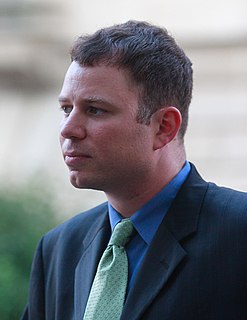
The American Society of Composers, Authors and Publishers (ASCAP) is an American not-for-profit performance-rights organization (PRO) that protects its members' musical copyrights by monitoring public performances of their music, whether via a broadcast or live performance and compensating them accordingly.

"Happy Birthday to You", also known as "Happy Birthday", is a song traditionally sung to celebrate a person's birthday. According to the 1998 Guinness World Records, it is the most recognized song in the English language, followed by "For He's a Jolly Good Fellow". The song's base lyrics have been translated into at least 18 languages. The melody of "Happy Birthday to You" comes from the song "Good Morning to All", which has traditionally been attributed to American sisters Patty and Mildred J. Hill in 1893, although the claim that the sisters composed the tune is disputed.

Peter Jenner is a British music manager and a record producer. Jenner, Andrew King and the original four members of Pink Floyd were partners in Blackhill Enterprises.

Hollywood accounting refers to the opaque or creative accounting methods used by the film, video, and television industry to budget and record profits for film projects. Expenditures can be inflated to reduce or eliminate the reported profit of the project, thereby reducing the amount which the corporation must pay in taxes and royalties or other profit-sharing agreements, as these are based on the net profit.
Peer-to-peer file sharing is the distribution and sharing of digital media using peer-to-peer (P2P) networking technology. P2P file sharing allows users to access media files such as books, music, movies, and games using a P2P software program that searches for other connected computers on a P2P network to locate the desired content. The nodes (peers) of such networks are end-user computers and distribution servers.

A copyfraud is a false copyright claim by an individual or institution with respect to content that is in the public domain. Such claims are wrongful, at least under U.S. and Australian copyright law, because material that is not copyrighted is free for all to use, modify and reproduce. Copyfraud also includes overreaching claims by publishers, museums and others, as where a legitimate copyright owner knowingly, or with constructive knowledge, claims rights beyond what the law allows.
The online service imeem was a social media website where users interacted with each other by streaming, uploading and sharing music and music videos. It operated from 2003 until 2009 when it was shut down after being acquired by MySpace.
Spark is a Canadian radio talk show about "technology and culture." Hosted by Nora Young, the program made its CBC Radio One début on September 5, 2007. The show is also broadcast on Sirius Satellite Radio 159 and, since January 9, 2010, on Vermont Public Radio's network of stations in the United States. It is also broadcast in Australia on the Australian Broadcasting Corporation's Radio National network. Spark is produced in Toronto by Young and a team that currently consists of Michelle Parise, Adam Killick, and Kent Hoffman.

Amazon Music is a music streaming platform and online music store operated by Amazon. Launched in public beta on September 25, 2007, in January 2008 it became the first music store to sell music without digital rights management (DRM) from the four major music labels, as well as many independents. All tracks were originally sold in 256 kilobits-per-second variable bitrate MP3 format without per-customer watermarking or DRM; however, some tracks are now watermarked. Licensing agreements with recording companies restrict the countries in which the music can be sold.

Audiogalaxy was an Internet music service with three incarnations. From 1998 to 2002, it was a file sharing system that indexed MP3 files. From mid-2002 to mid-2010, it was a promotional website for the Rhapsody music subscription service. Finally, from mid-2010 through 2012, it was a personal audio place shifting service. Audiogalaxy ceased operations on January 31, 2013.

Knol was a Google project that aimed to include user-written articles on a range of topics. Lower-case, the term knol, which Google defined as a "unit of knowledge", referred to an article in the project.

Techdirt is an American Internet blog that reports on technology's legal challenges and related business and economic policy issues, in context of the digital revolution. It focuses on intellectual property, patent, information privacy and copyright reform in particular.
Humble Bundle, Inc. is a digital storefront for video games, which grew out of its original offering of Humble Bundles, collections of games sold at a price determined by the purchaser and with a portion of the price going towards charity and the rest split between the game developers. Humble Bundle continues to offer these limited-time bundles, but have expanded to include a greater and more persistent storefront. The Humble Bundle concept was initially run by Wolfire Games in 2010, but by its second bundle, the Humble Bundle company was spun out to manage the promotion, payments, and distribution of the bundles. In October 2017, the company was acquired by Ziff Davis through its IGN Entertainment subsidiary, though operates as a separate subsidiary.
Copyright Alert System (CAS) was a voluntary industry effort to educate and penalize internet users who engage in the unauthorized and unlawful distribution of copyrighted works via peer-to-peer file sharing services. The program was operated by the Center for Copyright Information, a consortium consisting of the Recording Industry Association of America (RIAA), the Motion Picture Association of America (MPAA), and the internet service providers AT&T, Cablevision, Comcast, Time Warner Cable, and Verizon.

V. A. Shiva Ayyadurai is an Indian-American engineer, politician, entrepreneur, and promoter of conspiracy theories, pseudoscience and unfounded medical claims. Ayyadurai makes the widely disputed claim to have invented email.
The Center for Copyright Information (CCI) is an American organization focused on advocacy and initiatives in support of copyright law. The CCI aims to educate the public about copyright law; coordinates with copyright owners and Internet service providers (ISPs) about issues related to online copyright infringement; assists with the design, implementation, review, and promotion of an online infringement notification and mitigation system ; collects and disseminates online infringement data; and promotes lawful means of obtaining copyrighted works. The organization was created as a partnership between industry associations, including the Motion Picture Association of America, the Recording Industry Association of America, and five major American Internet service providers.
Rumblefish Inc. is a music licensing company specializing in all forms of synchronization licensing with a focus on 'micro-licensing' and online network monetization such as with YouTube's Content ID. It covers over 1.8 million pieces of music and it licenses over 20,000 soundtracks on more than nine million social videos.
Net bias is the counter-principle to net neutrality, which indicates differentiation or discrimination of price and the quality of content or applications on the Internet by ISPs. Similar terms include data discrimination, digital redlining, and network management.
Jennifer Nelson is an American documentary filmmaker, based in New York, known for successfully suing the company Warner/Chappell Music for false claims of copyright to the song "Happy Birthday to You", thereby clarifying its public domain status in the US.

The Massachusetts Pirate Party (MassPirates) is the Massachusetts affiliate of the United States Pirate Party and a political designation in Massachusetts officially recognized by the Secretary of the Commonwealth of Massachusetts. The Massachusetts Pirate Party was formed in May 2010 by James O’Keefe, Christine Reynolds and Erik Zoltan. They are active in promoting privacy, transparent government, and innovation by reining in copyright laws and eliminating patent laws. MassPirates ran candidates for State Representative in 2014 and 2016 and elected their first office holder in 2015.










